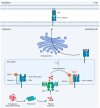Loss of Heterozygosity (LOH) Affecting HLA Genes in Breast Cancer: Clinical Relevance and Therapeutic Opportunities
- PMID: 39766811
- PMCID: PMC11675875
- DOI: 10.3390/genes15121542
Loss of Heterozygosity (LOH) Affecting HLA Genes in Breast Cancer: Clinical Relevance and Therapeutic Opportunities
Abstract
Major histocompatibility complex (MHC) class-I molecules (or Human Leucocyte Antigen class-I) play a key role in adaptive immunity against cancer. They present specific tumor neoantigens to cytotoxic T cells and provoke an antitumor cytotoxic response. The total or partial loss of HLA molecules can inhibit the immune system's ability to detect and destroy cancer cells. Loss of heterozygosity (LOH) is a common irreversible genetic alteration that occurs in the great majority of human tumors, including breast cancer. LOH at chromosome 6, which involves HLA genes (LOH-HLA), leads to the loss of an HLA haplotype and is linked to cancer progression and a weak response to cancer immunotherapy. Therefore, the loss of genes or an entire chromosomal region which are critical for antigen presentation is of particular importance in the search for novel prognostic and clinical biomarkers in breast cancer. Here, we review the role of LOH-HLA in breast cancer, its contribution to an understanding of cancer immune escape and tumor progression, and discuss how it can be targeted in cancer therapy.
Keywords: HLA class-I; LOH HLA; breast cancer; cancer immune escape.
Conflict of interest statement
The authors declare no conflicts of interest.
Figures





Similar articles
-
HLA class I alterations in breast carcinoma are associated with a high frequency of the loss of heterozygosity at chromosomes 6 and 15.Immunogenetics. 2018 Nov;70(10):647-659. doi: 10.1007/s00251-018-1074-2. Epub 2018 Aug 25. Immunogenetics. 2018. PMID: 30145665
-
Copy Neutral LOH Affecting the Entire Chromosome 6 Is a Frequent Mechanism of HLA Class I Alterations in Cancer.Cancers (Basel). 2021 Oct 9;13(20):5046. doi: 10.3390/cancers13205046. Cancers (Basel). 2021. PMID: 34680201 Free PMC article.
-
Frequency and genetic basis of MHC, beta-2-microglobulin and MEMO-1 loss of heterozygosity in sporadic breast cancer.Tissue Antigens. 2002 Sep;60(3):235-43. doi: 10.1034/j.1399-0039.2002.600305.x. Tissue Antigens. 2002. PMID: 12445306
-
Involvement of HLA class I molecules in the immune escape of urologic tumors.Actas Urol Esp. 2014 Apr;38(3):192-9. doi: 10.1016/j.acuro.2013.06.006. Epub 2013 Dec 7. Actas Urol Esp. 2014. PMID: 24315763 Review. English, Spanish.
-
Cancer immune escape: MHC expression in primary tumours versus metastases.Immunology. 2019 Dec;158(4):255-266. doi: 10.1111/imm.13114. Epub 2019 Oct 1. Immunology. 2019. PMID: 31509607 Free PMC article. Review.
Cited by
-
Unraveling the Role of Tumor-Infiltrating Immune Cells in Head and Neck Squamous Cell Carcinoma: Implications for Antitumor Immune Responses and Immunotherapy.Int J Mol Sci. 2025 Jun 30;26(13):6337. doi: 10.3390/ijms26136337. Int J Mol Sci. 2025. PMID: 40650111 Free PMC article. Review.
-
Decoding MHC loss: Molecular mechanisms and implications for immune resistance in cancer.Clin Transl Med. 2025 Jul;15(7):e70403. doi: 10.1002/ctm2.70403. Clin Transl Med. 2025. PMID: 40673641 Free PMC article. Review.
References
-
- Aptsiauri N., Carretero R., Garcia-Lora A., Real L.M., Cabrera T., Garrido F. Regressing and progressing metastatic lesions: Resistance to immunotherapy is predetermined by irreversible HLA class I antigen alterations. Cancer Immunol. Immunother. 2008;57:1727–1733. doi: 10.1007/s00262-008-0532-3. - DOI - PMC - PubMed
Publication types
MeSH terms
Substances
Grants and funding
LinkOut - more resources
Full Text Sources
Medical
Research Materials

